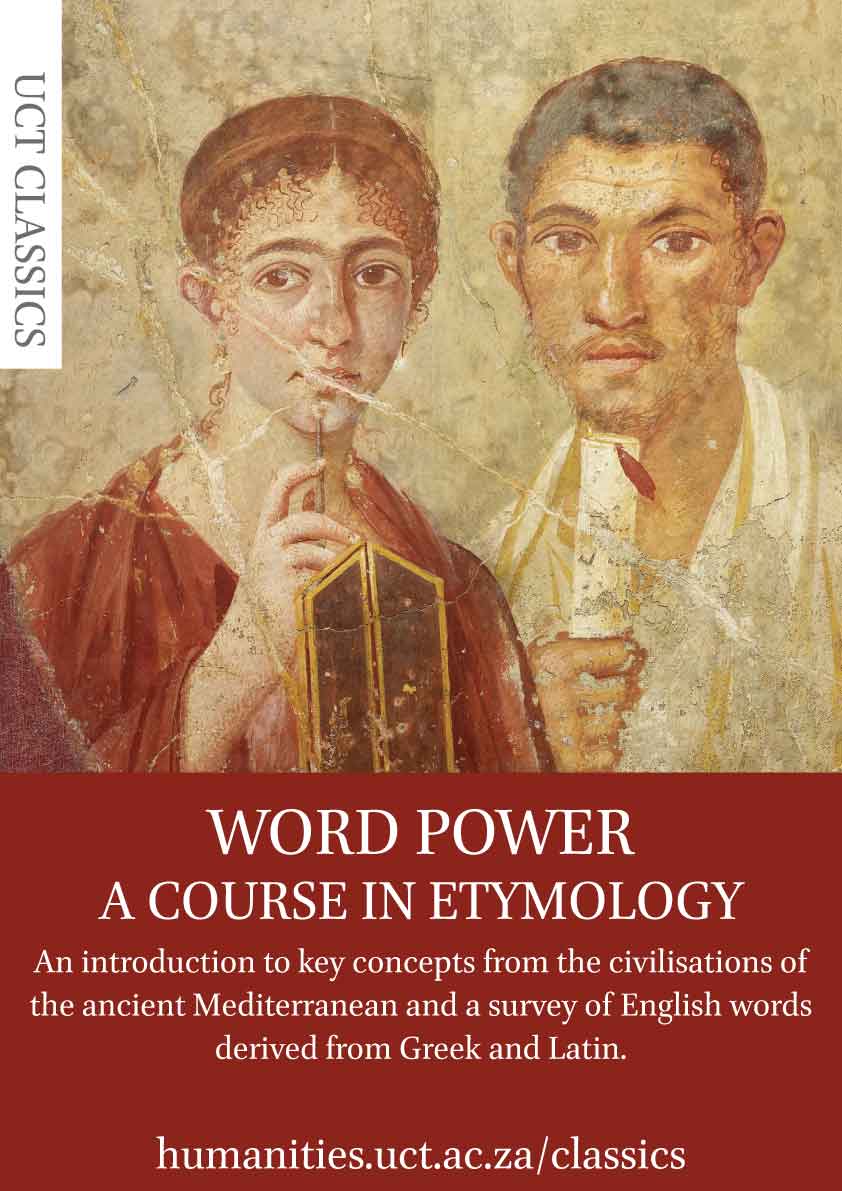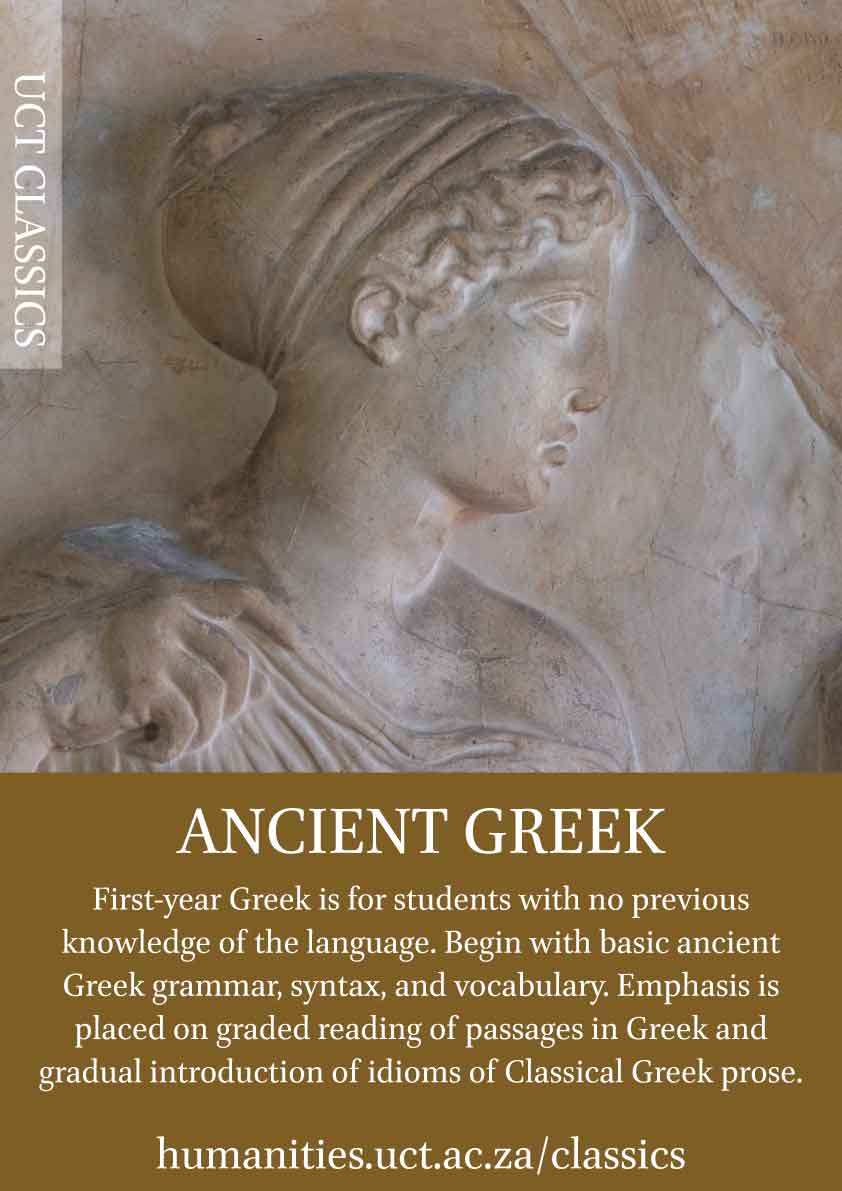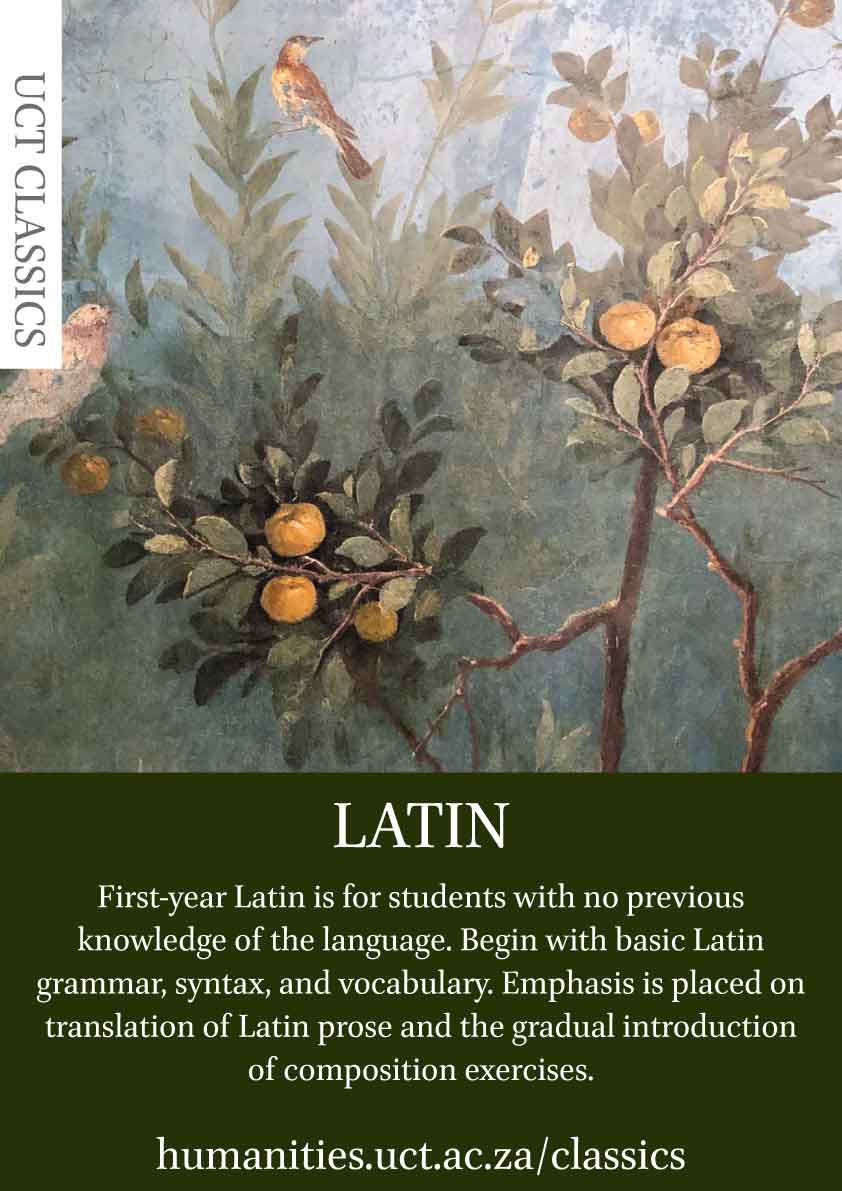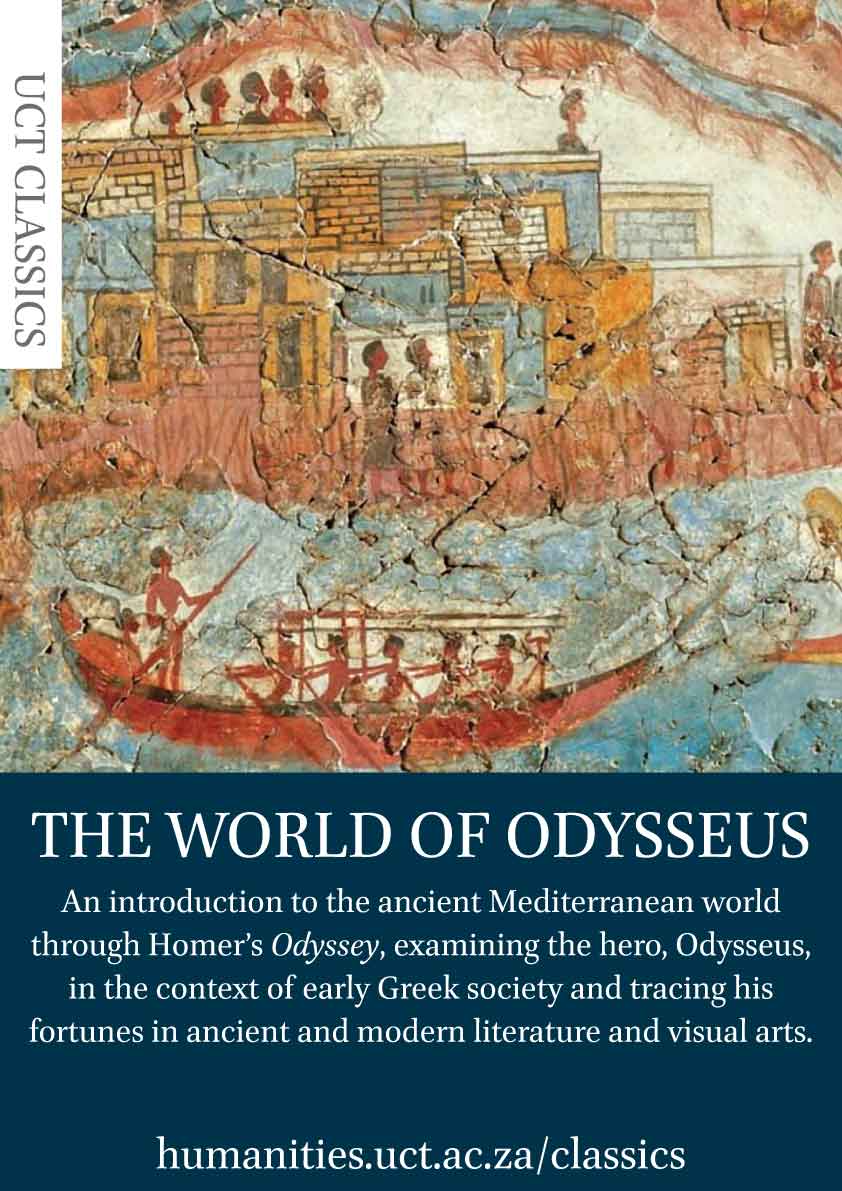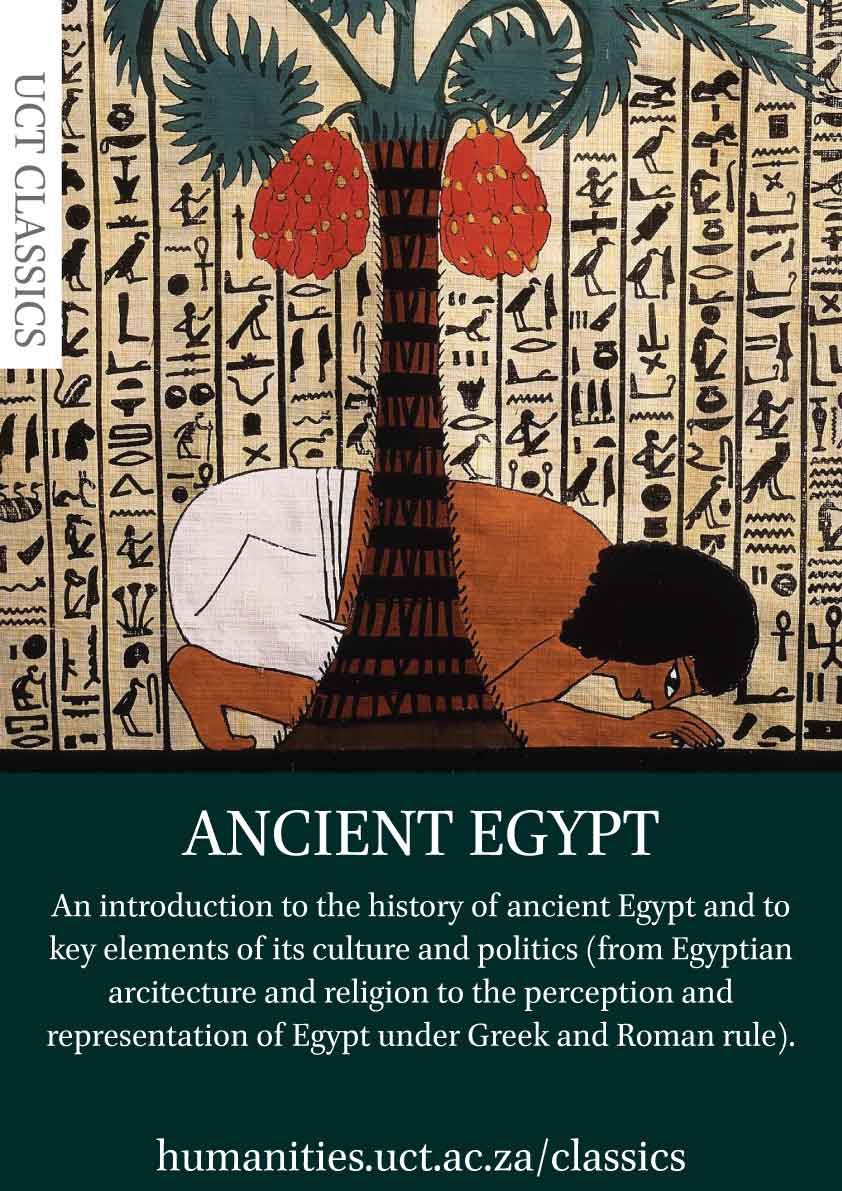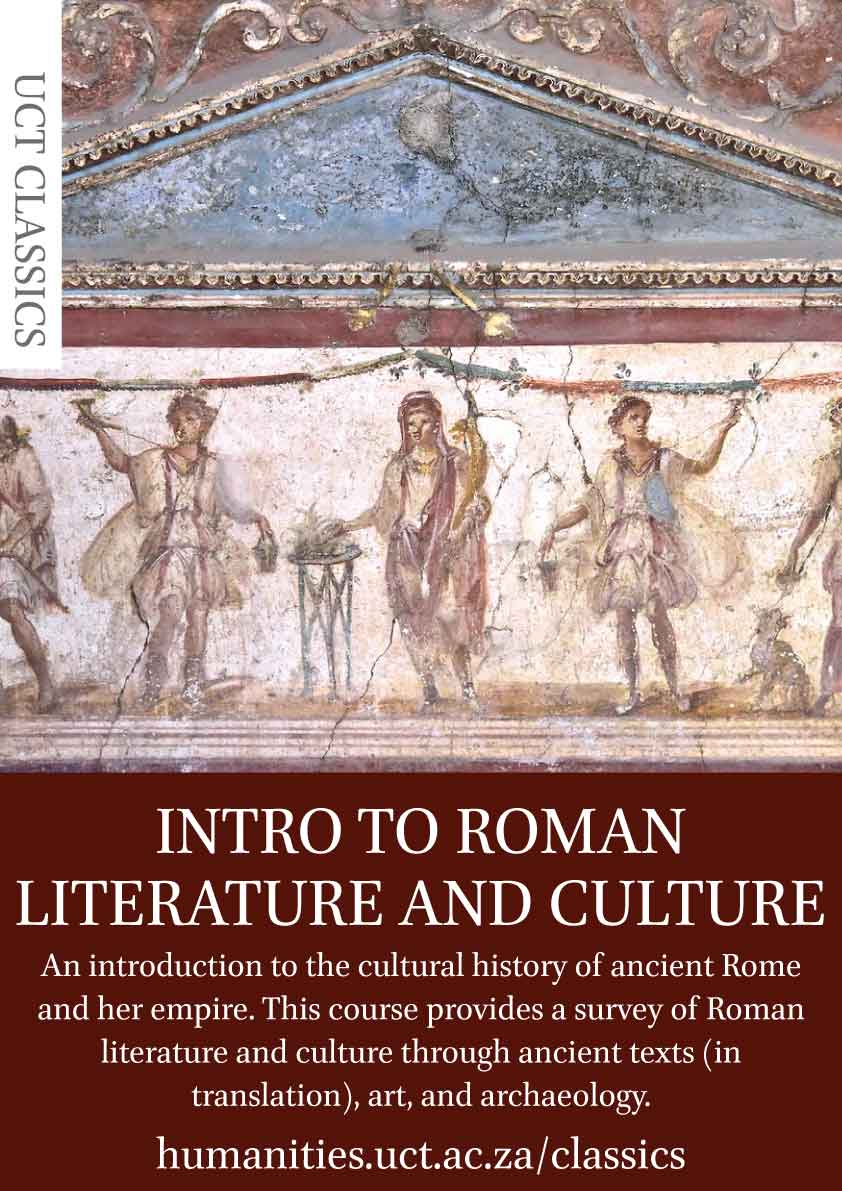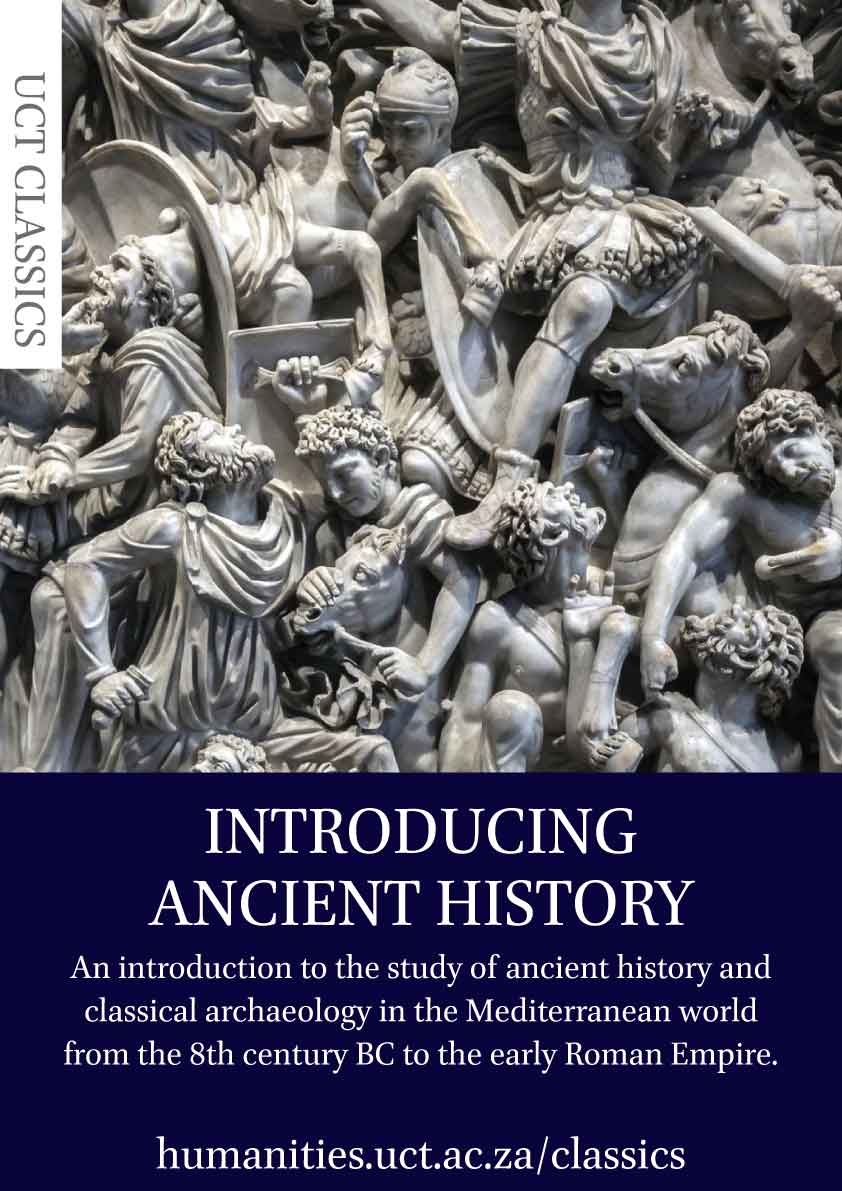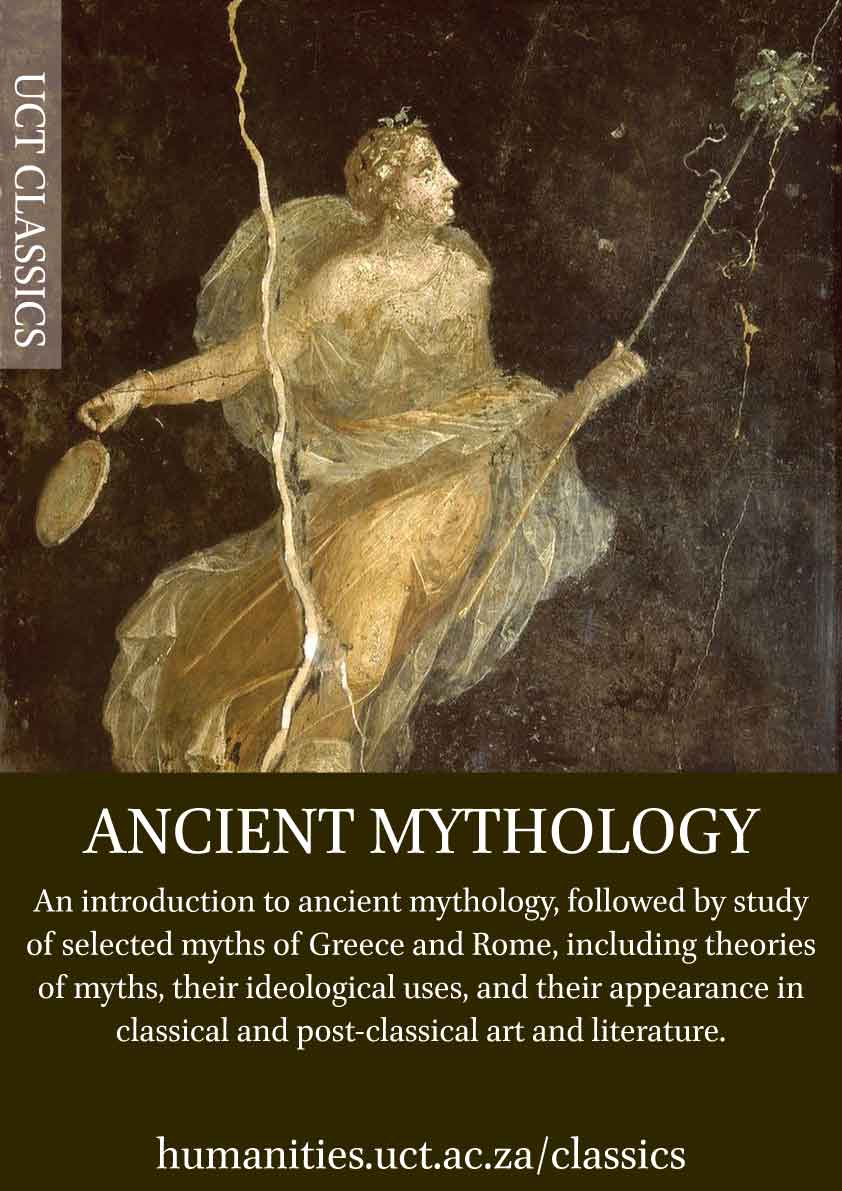The courses offered by the Classics Section fall into two main categories: (1) Ancient Greek and Latin Language courses and (2) Classical Culture and History courses which require no knowledge of Greek or Latin. As a result, there are different 'tracks' towards a major in Classical Studies: the Greek track, the Latin track, and the Cultural/Historical track.
Classical Studies is considered to be a teaching subject (cognate with History) for students wishing to progress to a Postgraduate education certificate.
Language Courses
Ancient Greek and Latin
Our first-year language courses cover basic grammar and syntax for students with no previous knowledge of Greek or Latin. In the senior courses (at second and third-year level) students study key authors in their socio-historical context and are instructed in advanced grammar, translation, composition, and stylistics.
In addition to Greek and Latin, we offer a first-year introduction to language (Word Power) which introduces the Greek and Latin origins of English words.
Introduction to Language
At first-year level, we offer an introduction to language. While not formally part of either of our language tracks, this Classical Culture and History Course provides a survey of English words derived from Greek and Latin. The course is designed to develop and support academic English vocabulary in various fields.
Word Power (SLL1002F/S)
An Introduction to key concepts from the civilisations of the ancient Mediterranean and a survey of English words derived from Greek and Latin. This course is popular and offered in both first and second semester. Word power is designed to develop and enhance your mastery of the English language. Through dictionary work and etymological study, the course focuses on enlarging your vocabulary and building up your knowledge of academic English in areas such as law, philosophy, history, mythology, literature, and medicine.
The course consists of three components:
- Words and ideas: focus on concepts deriving from ancient words
- Word-building skills
- Style: focus on the use of English grammar
Entrance requirements: none.This course may also be offered in Summer and/or Winter Term; please consult the Faculty.
Ancient Greek
First-year Courses
Required for entry into senior Greek
First-year Ancient Greek courses (Greek IA and IB) cover basic grammar and syntax, and include reading of selected texts, language work, and aspects of Greek culture.
Greek IA (SLL1052F)
This course is designed for students with no previous knowledge of Ancient Greek. It provides an introduction to basic grammar and syntax, and a basic working vocabulary. A great emphasis is placed in graded reading of passages in Greek and gradual introduction of idioms of Classical Greek prose. Aspects of Ancient Greek culture and historical context are included where relevant.
Entrance requirements: none.
Greek IB (SLL1053S)
This course builds further on the grammar and syntax taught in SLL1052F Greek IA and provides further instruction in Greek vocabulary, grammar and syntax (including complex sentences and subordinate clauses: temporal, concessive, final, consecutive, indirect statement). The reading passages become gradually more complex and are based increasingly on actual surviving Greek examples of dramatic comedy and forensic oratory. There is increased practice in translating English into Greek, and Greek into English.
Entrance requirements: SLL1052F Greek IA.
Senior Courses
Required for a major in Classical Studies (Greek track)
Senior Ancient Greek courses (II and III level) cover advanced grammar, composition and stylistics, and include a selection of works by key Greek writers (e.g. Homer, Herodotus, Sophocles, Aristophanes, Euripides, Thucydides, Plato, Demosthenes).
Greek IIA (SLL2052F)
This course includes introduction to the study of two authors drawn from the following list: Homer, Herodotus, Sophocles, Aristophanes, Euripides, Thucydides, Plato, Greek orators in their sociohistorical context, practice in unseen translation, and translation from English into Greek. In each semester one prose work and one poetic work is read (subject to availability of staff).
Entrance requirements: SLL1053S Greek IB.
Greek IIB (SLL2053S)
This course continues the study of two additional authors not covered in SLL2052F drawn from the following list: Homer, Herodotus, Sophocles, Aristophanes, Euripides, Thucydides, Plato, Greek orators, in their socio-historical context, further practice in unseen translation, and introduction to prose composition. In each semester one prose work and one poetic work is read (subject to availability of staff).
Entrance requirements: SLL2052F Greek IIA.
Greek IIIA (SLL3052F)
This course includes advanced study of works from two authors drawn from the following list: Homer, Herodotus, Sophocles, Aristophanes, Euripides, Thucydides, Plato, Greek orators, in their sociohistorical context, advanced unseen translation, and introduction to stylistics analysis. In each semester one prose work and one poetic work is read (subject to availability of staff).
Entrance requirements: SLL2053S Greek IIB.
Greek IIIB (SLL3053S)
This course continues the study of two additional authors not covered in SLL3052F drawn from the following list: Homer, Herodotus, Sophocles, Aristophanes, Euripides, Thucydides, Plato, Greek orators, in their socio-historical context, advanced unseen translation, and stylistics analysis. In each semester one prose work and one poetic work is read (subject to availability of staff).
Entrance requirements: SLL3052F Greek IIIA.
Latin
First-year Courses
Required for entry into senior Latin*
First-year Latin courses (Latin IA and IB) cover basic grammar and syntax, and includes reading of selected prose and verse passages, and a study of various aspects of Roman life.
*Students who have Matriculated in Latin with a C grade or above may be admitted directly into Latin IB (SLL1051S) at the discretion of the Head of Classics. Students with Matric Latin who do not qualify for admission into Latin IB will be required to take Latin IA.
Latin IA (SLL1050F)
This course is primarily designed for those who have not studied Latin before. It is also open to those who have done some Latin at school but who do not qualify for admission into Latin IB.
The course provides an introduction to basic Latin grammar, syntax, and vocabulary. Emphasis is placed on translation of Latin prose and the gradual introduction of composition exercises.
Entrance requirements: none.
Latin IB (SLL1051S)
The course builds on Latin IA and provides further instruction in Latin vocabulary, grammar and syntax (including complex sentences and subordinate clauses – temporal, concessive, final, consecutive, oratio obliqua), and includes introductory study of a selection of continuous prose passages, and practice in translation of complex sentences from English into Latin.
Entrance requirements: SLL1050F Latin IA (or C grade matriculation).
Senior Courses
Required for a major in Classical Studies (Latin track)
Senior Latin courses (II and III level) cover advanced grammar, composition and stylistics, and include a selection of works by key Latin writers (e.g. Cicero, Livy, Catullus, Sallust, Virgil, Tacitus, Lucretius, Ovid, Petronius).
Latin IIA (SLL2050F)
This course provides instruction and practice in translation of unseen passages in prose and poetry as well as translation of increasingly more complex sentences from English into Latin. A significant portion of the course is devoted to introducing study of Latin literature through a variety of Classical texts. Fundamental authors exemplifying Latin prose and poetry are covered, since these offer a convenient introduction to oratory, historiography, and a range of poetic forms.
Entrance requirements: SLL1051S Latin IB. A student with a C or above in Latin (SC) or a 5 or above (NSC) may register directly for this course at the discretion of the Head of Department in consultation with the Section Head.
Latin IIB (SLL2051S)
This course builds on SLL2050F and continues practice in translation of unseen passages in prose and poetry as well as an introduction to Latin prose composition, which enhances the student’s grasp of Latin idiom and a range of registers. Additional key Latin authors in prose and poetry are introduced at this stage, usually historiographical prose and narrative poetry.
Entrance requirements: SLL2050F Latin IIA.
Latin IIIA (SLL3050F)
This course introduces advanced study of Latin language and literature. Students continue with practice in unseen translation from prose and poetry but are also introduced to stylistic analysis of Latin prose. Literary study now focuses on more challenging aspects of important poetic and prose texts, with appreciation of historical and social context and literary pedigree.
Entrance requirements: SLL2051S Latin IIB.
Latin IIIB (SLL3051S)
This course continues advanced study of Latin language and literature. Students continue with practice in unseen translation from prose and poetry and refine their appreciation of Latin prose style and its historical development. Literary study comprises remaining important poetic and prose texts, with appreciation of historical and social context and literary pedigree.
Entrance requirements: SLL3050F Latin IIIA.
Classical Culture and History Courses
Classical Culture and History courses focus on Greek, Roman, and Mediterranean history, culture and mythology (including North Africa and Ancient Egypt). All material is studied in English, and no knowledge of Ancient Greek or Latin is required. However, students intending to proceed to Classical Studies Honours are strongly encouraged to include a course in Greek or Latin in their undergraduate curriculum.
First-year Courses
Not required for entry into senior Classical Culture and History courses
First-year Classical Culture and History courses offer introductions to a range of important areas within the field of Classics.
The World of Odysseus (SLL1054F)
This course provides an introduction to the ancient Mediterranean world through Homer's Odyssey, examining the hero, Odysseus, in the context of early Greek society and its oral traditions, and tracing the hero's fortunes in ancient and modern literature, film and art. All texts are studied in English, and no knowledge of ancient languages is required.
Entrance requirements: none.
Ancient Egypt (SLL1057F)
This course provides an overview of Egyptian history with special reference to the dynastic period c 3050 to 1069 BC and the period of foreign occupation (Nubian dynasty, Ptolemies), 664-to 30 BC. The course will address issues of Egyptian chronology and identity and provide an introduction to key aspects of Egyptian civilization.
Entrance requirements: none.
Introduction to Roman Literature and Culture (SLL1136S)
This course provides an introduction to the cultural history of ancient Rome and her empire. The Aeneid, the poet Virgil’s epic account of Rome’s origins and of the vision of her later greatness, will form a starting point for a survey of Roman culture through ancient texts (in translation), art and archaeology. Students will acquire basic familiarity with the most significant Roman literary genres, and with the study of Roman life and society through the analysis of materials ranging from wall-paintings in private houses to the remains of the monuments and public spaces of Rome as an imperial capital.
Entrance requirements: none.
Introducing Ancient History (SLL1097S)
An introduction to the study of ancient history and classical archaeology in the Mediterranean world from the 8th century BC to the early Roman Empire (1st century AD). The focus is on the development of Rome in the Italian peninsula and the emergence of Rome as a major power in the Mediterranean world. The reigns of the early Roman emperors are also covered.
Entrance requirements: none.
Introduction to Classical Literature and Thought (SLL1055S)
[Not currently offered]
This course provides an education in cultural literacy through written, visual and performative texts (including film), focusing on Greek and Roman writers and artists and their influence in the modern age. Topics covered include Greek and Roman theatre, art, religion, love, sex and gender roles, the novel in antiquity, science and philosophy, Pompeii. (Not all these topics are necessarily taught every year).
Entrance requirements: none.
Senior Courses
Required for a major in Classical Studies (Cultural/Historical track)*
Senior Classical Culture and History courses offer advanced study of central aspects of ancient Greek and Roman culture. Most of these Culture and History courses are offered in alternate years (i.e. some are offered only in even-numbered years and others only in odd-numbered years) and can be taken either at 2000 level or at 3000 level in the year that they are offered. This ensures that a student can take one set of courses at 2000 level in their second year and a different set of courses at 3000 level in their third year.
* Students should consult the Humanities Faculty Handbook for detailed major requirements and to determine which courses are offered in a particular year.
Extended Essay Option
Recommended for students intending to proceed to Classical Studies Honours
Students majoring in Classical Studies (Cultural/Historical track) may choose to complete an extended essay (of around 10,000 words) in their final year. This option is recommended (but not compulsory) for students who intend to proceed to Classical Studies Honours. Students should consult the Head of Classics to discuss both the topic and the availability of suitable supervision. Final-year coursework and assessment are adjusted to accommodate the demands of the essay project.
Ancient Mythology (SLL2058F)
This course provides an introduction to Greek mythology and concepts of the divine, followed by a detailed study of selected myths of Ancient Greece and Rome, including the following topics: Theories of Myths and their meaning; the ideological uses of Myth; Myth in Classical Art and literature; Myth in post-classical literary and artistic traditions.
Entrance requirements: 2nd year status.
The City in the Ancient World (SLL2057F/3057F)
A study of some major cities of the ancient Mediterranean world, such as Rome, Alexandria, Byzantium and Carthage. This course will consider how these cities developed and were managed, and what life was like for their inhabitants. The evidence includes archaeological finds, and art and literary texts, especially those associated with the culture of Alexandria.
Entrance requirements: 2nd year status or 3rd year status – depending on the level at which you wish to register for the course.
Roman Literature and Empire (SLL2059F/3059F)
The course deals with the phenomenon of the Roman Empire from the 1st century BC to about the 3rd century AD. It examines the nature and development of Roman rule under the emperors and the kinds of literature that emerged in a culturally and linguistically diverse empire, whether written in poetry or prose.
Entrance requirements: 2nd year status or 3rd year status – depending on the level at which you wish to register for the course.
Athenian Life and Culture (SLL2055S/3055S)
A study of key aspects of the world of ancient Athens. Attention is given to the history of the city and its political and social organisation – especially democracy, slavery, and the life of women. The culture, art, and architecture of Athens are examined in terms of their relation to Athenian religion and ideology. Study of select political works of Plato and Aristotle is included.
Entrance requirements: 2nd year status or 3rd year status – depending on the level at which you wish to register for the course.
Roman Society and Law (SLL2056S/3056S)
This course focuses on key aspects of Ancient Rome and its civilisation. Topics covered include the concept of citizenship, marriage and inheritance law, slavery, business practice and welfare schemes, crime and punishment, religion, and visual and material culture. Attention is also given to selected examples of the literary production of Rome, especially historiography, biography, and poetry.
Entrance requirements: 2nd year status or 3rd year status – depending on the level at which you wish to register for the course.
Sex from Sappho to Cyber (SLL3001F)
[Not currently offered]
A study of selected aspects of the erotic in (particularly) Western literature from Greek to Roman antiquity to the modern period. The focus of the course is literary (prose, poetry, drama), but other media are examined, especially those pertaining to ‘virtual’ erotics (as enabled by the technologies afforded through the internet).
Entrance requirements: 3rd year status.

Studying Classics at UCT made me realize the privilege of being able to access the thoughts and experiences of people who lived on the other side of the world two thousand years ago. That realization is an awe-inspiring feeling that has never left me since I first experienced it in Beattie Building all those decades ago.
James Loeb Professor of the Classics, Harvard University
BA UCT 1973
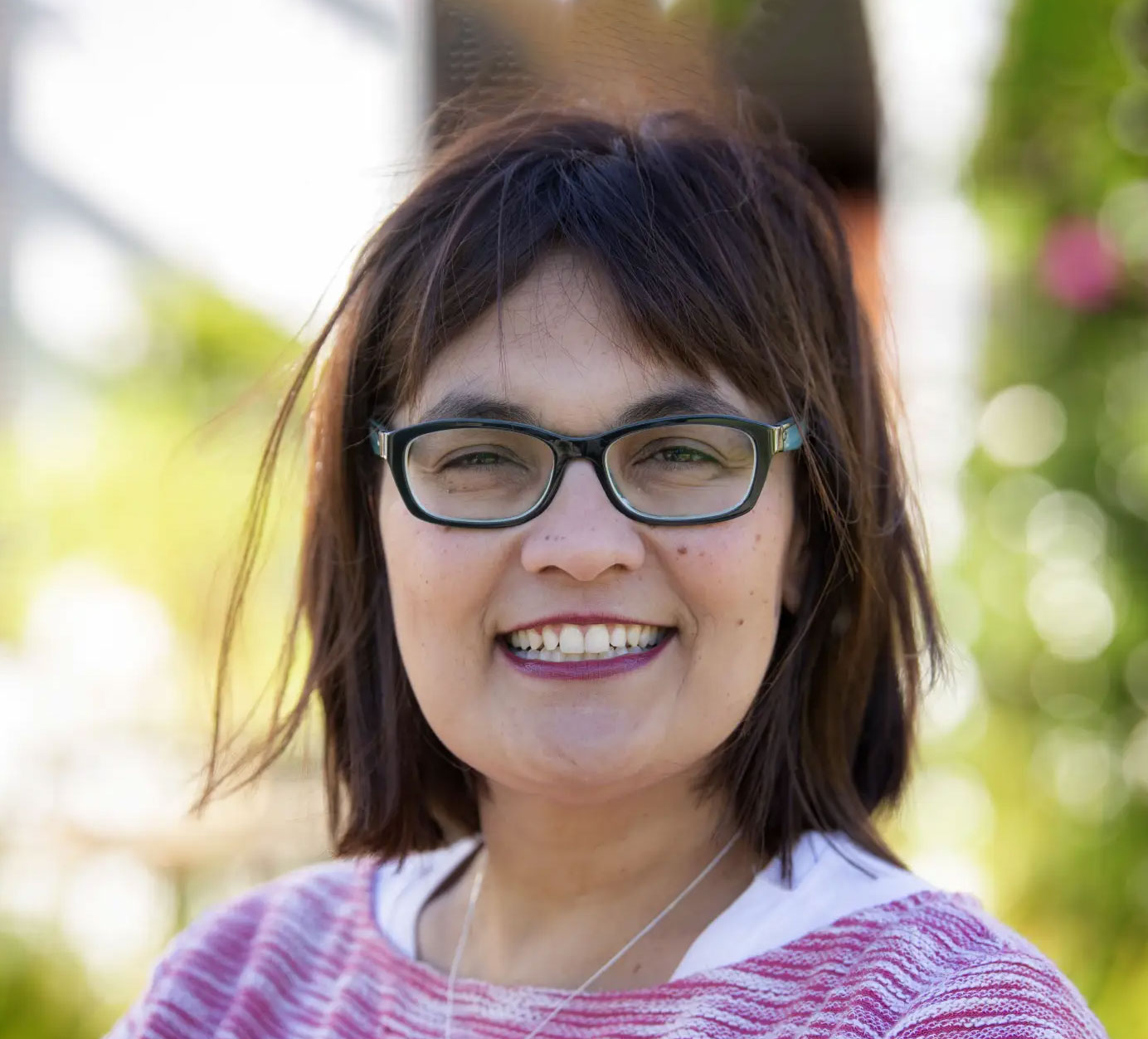
It has, without a doubt, been the very best decision I made to major in Latin and I would recommend the study of the Classics as a way of broadening one’s perspective, widening the lens with which one views the world and gaining a treasure trove of knowledge which is useful in ways one doesn’t quite fathom while still a student.
Lawyer; Author; Columnist; Governance Specialist
BA (LAW) UCT 1991

When it came to the cut and thrust of things, I found that I could write clearly and concisely and could argue the merits of a case. I could look at a complex situation from many points of view, getting to grips with the details while also standing back and thinking strategically about the whole ... In short, I believe my liberal arts and classical background served me very well.
CEO of Westpac, 2008 to 2015; Member of the Group of Thirty
BA UCT 1976
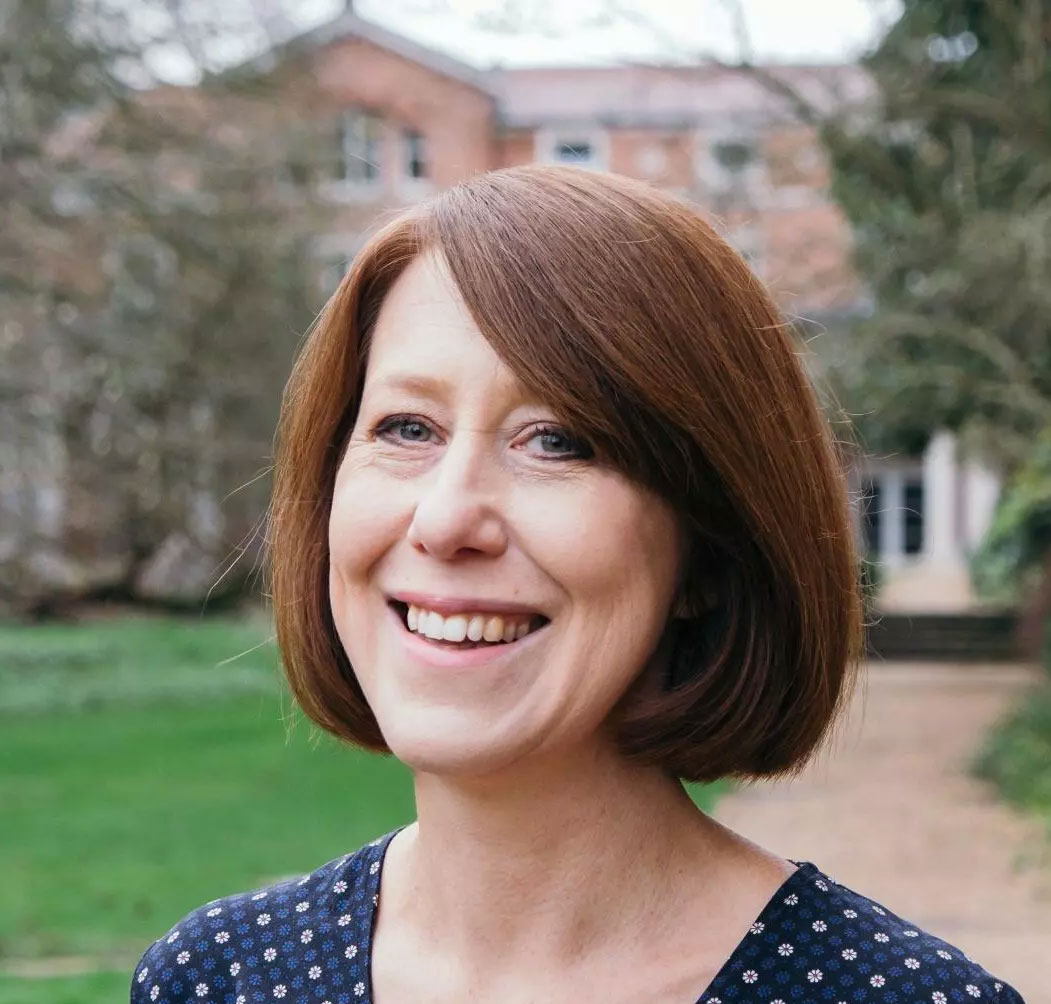
Not only did I enjoy studying classics hugely, finding it one of the most stimulating aspects of my time at UCT; more than that, studying classics at UCT was an essential step in my intellectual and professional journey.
Regius Professor of Civil Law, Cambridge
BA UCT 1995
